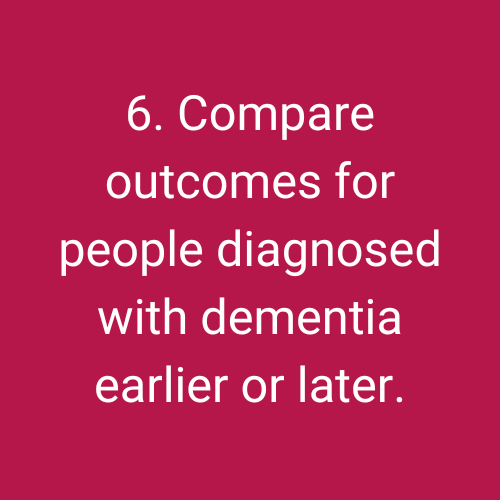Led by: Cambridge University and London School of Economics and Political Science
Aims: We will investigate the unequal levels of care received by people with dementia. We will find out which groups of people are and are not able to get the care and support they need for dementia. We will look at what gets in the way of people getting the care they need.
Summary
Workstream 2 (WS2) aims to understand whether different people with dementia receive unequal levels of care. We will explore how many people who need care are going without, what is stopping them or helping them to get care and what happens to people who don’t receive the care they need.
We will answer these questions:
- Are some groups of people receiving lower levels/quality of health and social dementia care? In other words, are there inequalities?
- Are these inequalities due to people not getting the care they need?
- What happens to people with dementia and their carers when they don’t get the care they need?
- Which groups of people are not getting the care they need? Are there changes over time in which care needs are not being met?
- Why do these inequalities exist? What helps or hinders people from getting the support they need? Are there examples of people who are getting good care although they’re from groups who generally do not? What can be learnt from their experiences about how to help people from groups who are currently getting low levels of care?
WS2 will use a few different ways of finding out the answers to these questions. We will use statistics collected by this and previous studies. We will also look at whether the following are connected to the level of care people receive:
- Whether the person with dementia is male or female or
- What their ethnic background is
- Their sexual orientation (Lesbian, Gay etc.)
- Whether they are married
- Where they live (in a town, city or the countryside)
- Socioeconomic status (a measure based on their work and money situation, among other things)
As well as looking at the statistics, we will interview people with dementia and their carers at 4 different points throughout the study. We will be talking to people from minority groups (for example LGBTQ+). We will compare the experiences of people from these groups who did and did not have difficulty getting the care they need (see Workstream 1 for more information about these interviews).By looking at the statistics as well as what people are saying about their experiences, we hope to find out about the problems and the solutions to unequal dementia care.

1. Recruit 900 people with dementia and follow-up

2. Investigate inequalities and barriers to dementia care

3. Compare costs and use of services with outcomes

4. Compare outcomes of self-funded with local authority funded care

5. Investigate the process of care planning and decision-making

6. Compare impact of late and early diagnosis on outcomes

7. Project coordination
Latest News
No news yet. We will update you on our progress, later in the project.
